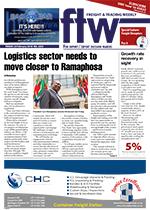As with his predecessors, president Cyril Ramaphosa’s state of the nation address was light on logistics. While Ramaphosa used the word “trade” four times, the speech was devoid of any mention of transport, cargo, airports, aircraft, freight, harbours or logistics. Rail was mentioned once, but in reference to localisation. There were three references to the road infrastructure – in the context of what has been built and maintenance. What will be welcomed by the road freight sector is the sentence: “As some of our projects are taking time to get off the ground and to enhance our efforts, I will assemble a team to speed up implementation of new projects, particularly water projects, health facilities and road maintenance.” There was more focus on the movement of data than that of freight. “We will soon establish a Digital Industrial Revolution Commission, which will include the private sector and civil society, to ensure that our country is in a position to seize the opportunities and manage the challenges of rapid advances in information and communication technology. “We will finalise our engagements with the telecommunications industry and other stakeholders to ensure that the allocation of spectrum reduces barriers to entry, promotes competition and reduces the cost to consumers,” he said. Ramaphosa is looking beyond the country’s borders to create new manufacturing jobs in South Africa. He said the Tripartite Free Trade Area agreement, which brings together SADC, Comesa and the East African Community, “will combine markets of 26 countries with a population of nearly 625 million. “It will open market access opportunities for South African export products, contribute to job creation and the growth of South Africa’s industrial sector. “Negotiations towards the Continental Free Trade Agreement are progressing at a brisk pace, and it is expected that the framework agreement could be concluded soon,” he said. Looking beyond the African hinterland, Ramaphosa said “South Africa will this year take over the chair of the BRICS group of countries, and will give priority to the promotion of value-added trade and intra-BRICS investment into productive sectors. Representatives of the freight and trading sector will have two opportunities to present the case for a greater focus on reducing the cost of moving freight in the country – and between it and its trading partners. One will be a jobs summit to “align the efforts of every sector and every stakeholder behind the imperative of job creation. “The summit will look at what we need to do to ensure our economy grows and becomes more productive, that companies invest on a far greater scale, that workers are better equipped, and that our economic infrastructure is expanded. “We will expect this summit to come up with practical solutions and initiatives that will be implemented immediately,” he said. Road, rail, air and sea transporters and logistics companies will have an important contribution to make to the summit. This would tie in with an investment conference, which is designed to remove the bottlenecks to reindustrialisation. The first bottleneck is South Africa’s uncompetitive freight and data costs, which have been documented by a number of studies and surveys by institutions like the World Bank and Stellenbosch University. These are the constraints on which the new Ramaphosa administration needs to focus.
INSERT
The first bottleneck to address is South Africa’s uncompetitive freight and data costs.

